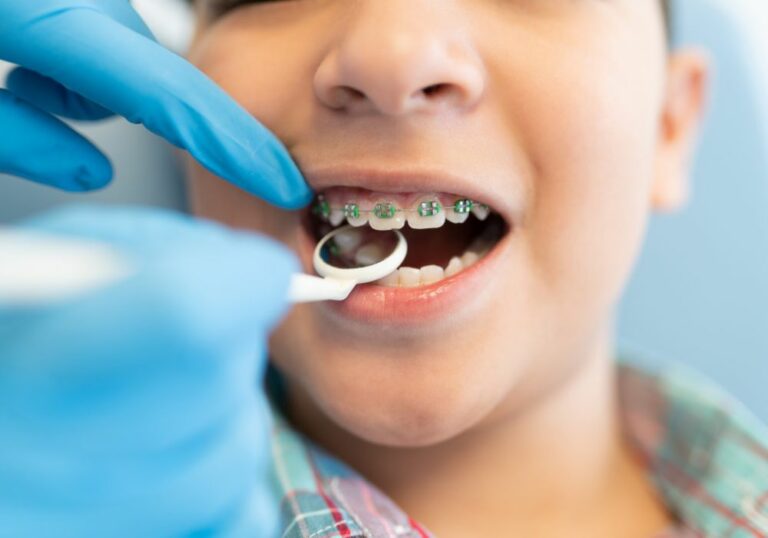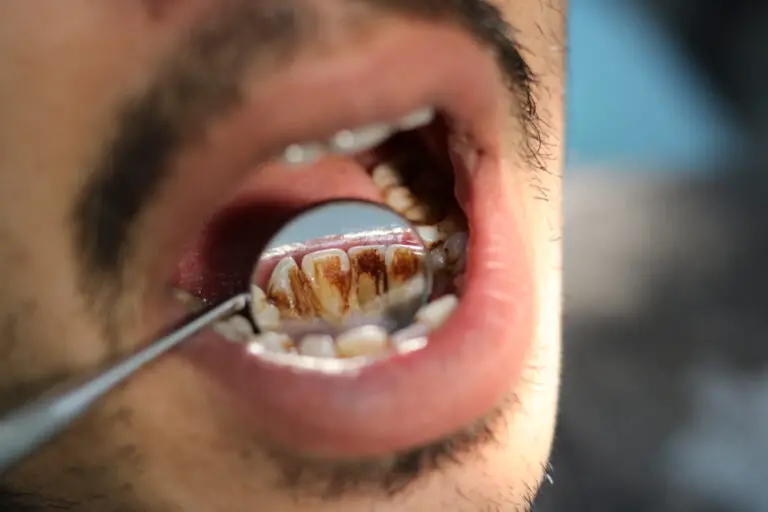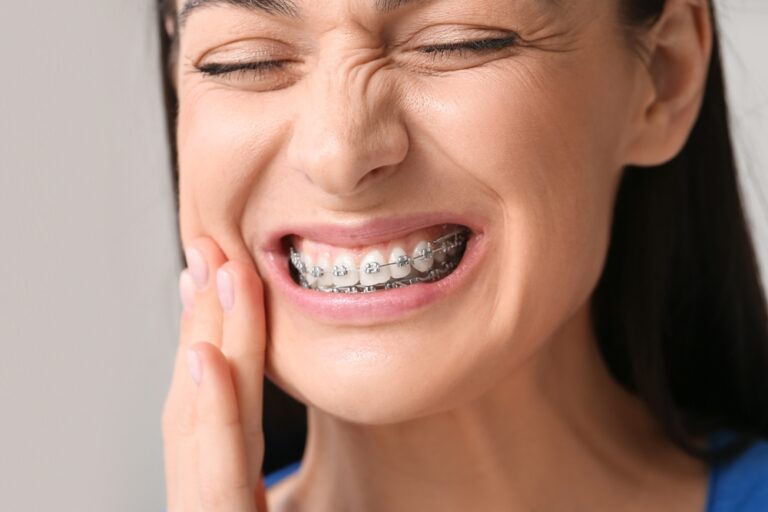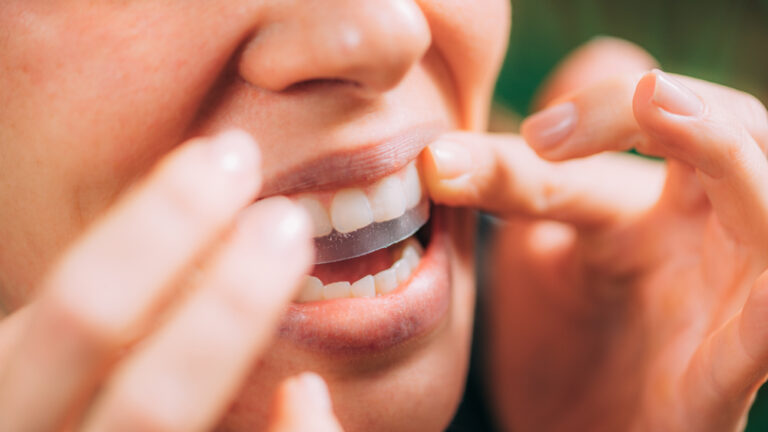It’s very common for teeth to be sensitive during and right after a teeth whitening treatment. But you might be surprised if your teeth are still tender and painful a week later. Teeth typically regain normal sensation within a few days, so ongoing sensitivity can be confusing and concerning.
There are a few key reasons why your teeth may continue to be sensitive long after whitening. Understanding the causes can help you find the right solutions to relieve discomfort and regain dental health.
What happens during teeth whitening?

Before exploring why sensitivity can linger, it helps to understand what happens when you chemically whiten your teeth.
Whitening treatments use bleaching agents like carbamide peroxide or hydrogen peroxide. These release unstable oxygen molecules that penetrate the microscopic pores of your enamel and reach the dentin layer underneath.
The oxygen acts like a stain remover, breaking apart and lifting away pigment molecules that have built up on and within the teeth. This breakdown of organic compounds lightens the natural color of the teeth.
However, the whitening process doesn’t just affect stains – it also impacts the structural components of the teeth including the dentin and pulp.
Effects on dentin tubules
The dentin contains tiny tubules that lead to the inner dental pulp containing nerves and blood vessels. The bleaching agents seep into these dentin tubules during treatment.
This not only lightens the dentin, but also exposes the nerve endings more directly to stimuli. The natural whitening process increases sensitivity of the teeth during and after treatment by irritating the nerves in the dentin tubules.
Dehydration of teeth
The peroxide solutions also have a temporary dehydrating effect on the teeth. Whitening strips away some of the fluid components of the enamel and dentin layers.
This means there is less insulation protecting the nerves, so pains signals can transmit more easily through the tooth for awhile until it rehydrates.
Overall, these chemical effects of whitening disrupt the neurological structure of the teeth, making them hypersensitive as a side effect. For most people, this heightened sensitivity is worst right after treatment but improves within a few days as the teeth recover.
However, for some people sensitivity persists longer…
Reason 1: Chemical irritation of the nerves
For certain people, the chemical agents used in whitening cause more severe and prolonged irritation of the nerves inside the dentin tubules. This can lead to sensitivity lasting a week or longer after treatment.
There are a few factors that determine how much post-whitening sensitivity you’ll experience:
- Concentration of whitening agent – Gels with 10-15% hydrogen peroxide or higher concentrations tend to cause more nerve irritation than lower concentrations.
- Contact time with whitening agent – The longer a bleaching gel is left on the teeth during treatment, the more inflammation it causes in the nerves.
- Personal traits – Older individuals and people who are genetically predisposed to dental sensitivity will likely experience more discomfort after whitening.
For instance, a 30 minute in-office whitening with 15% hydrogen peroxide gel may lead to a week or more of sensitivity. While an overnight home kit with 5% carbamide peroxide strips may only cause sensitivity for a couple days.
Managing chemical irritation:
If the prolonged sensitivity is due to chemical inflammation of the nerves, try these tips:
- Use desensitizing toothpaste containing potassium nitrate or strontium chloride. These help calm nerve transmission to numb sensitivity.
- Apply desensitizing gels like Sensodyne Rapid Relief directly to sensitive areas.
- Take over-the-counter pain medication like NSAIDs to relieve inflammation.
- Wear a custom night guard if you grind your teeth, which makes sensitivity worse.
The sensitivity should gradually improve on its own as the nerves heal and become less agitated. But if it persists beyond 2 weeks, see your dentist to address any underlying issues that may be contributing.
Reason 2: Dehydration effects on the teeth

As mentioned earlier, whitening solutions drain some of the natural fluid out of the teeth during treatment. Specifically, hydrogen peroxide oxidizes and removes some mineral content and water from the enamel and dentin layers.
This temporary dehydration means the enamel is less insulated. The dentin tubules lose fluid as well, leaving the nerves more exposed.
So even after the initial chemical irritation has worn off, the teeth remain sensitive for some time until the lost moisture is replenished.
It can take up to 1 week for rehydration and remineralization to occur after whitening. Until the fluids are restored, teeth stay dried out and nerves remain unprotected. This prolongs sensitivity.
Relieving dehydration:
Here are some ways to rehydrate teeth after the drying effects of whitening:
- Use a fluoride mouth rinse like ACT twice daily – fluoride helps strengthen enamel and soothe nerves
- Apply tooth mousse containing CPP daily – this replaces lost calcium and phosphate minerals
- Get professional fluoride treatments from your dentist to remineralize your enamel
- Increase water intake and consume hydrating foods like fruits and vegetables
- Avoid sugary or acidic foods and drinks which demineralize teeth more
Proper oral hygiene with gentle brushing and flossing also helps prevent further dehydration effects. Within about a week of focused remineralization, your teeth should regain their protective fluids and sensitivity should diminish.
Reason 3: Amplification of underlying dental issues
For some individuals, the whitening process reveals or amplifies existing problems with the teeth that were previously unnoticed. Common examples include:
- Minor tooth decay – Small areas of decay on the teeth become irritated and inflamed by the bleaching agents. The whitening makes these tiny cavities become suddenly painful.
- Cracked teeth – Micro-fissures or cracks in the enamel harbor bacteria, fluid, and debris. The whitening chemicals penetrating these cracks cause irritation inside the teeth.
- Worn enamel – Years of erosion, abrasion, or grinding can make enamel thinner. Sensitivity is felt more in areas with deteriorated enamel after they are chemically treated.
- Exposed roots – Gum recession exposes the cementum layer, which is more sensitive than enamel. Bleaching agents provoke pain in exposed root surfaces.
- Leaky fillings – Old fillings with gaps permit penetration of whitening chemicals into the underlying dentin. This becomes irritating to the inner tooth.
Rather than causing new sensitivity, the whitening simply reveals existing vulnerabilities in the teeth by inflaming these problem areas.
Diagnosing underlying issues:
If your sensitivity continues longer than 2 weeks after whitening, it’s important to see your dentist to evaluate for any underlying issues.
They will check for signs of decay, examine your enamel for thinning or cracks, inspect around gum lines, and scan for leaky restorations.
Depending on any problems found, your dentist may recommend:
- Treating minor cavities
- Sealing cracks
- Restoring worn enamel
- Gum grafting for recession
- Replacing old fillings
Properly addressing these underlying flaws can help resolve lingering sensitivity problems after whitening.
Tips to prevent prolonged sensitivity

While some sensitivity is expected, you can take precautions before and after whitening to minimize irritation:
Before whitening:
- Get any existing dental work checked for gaps or defects that could become irritated
- Use pre-treatment desensitizing toothpaste for 2 weeks beforehand
- Discuss options for lower concentration gels with your dentist if very sensitive
During whitening:
- Use products with built-in desensitizers like potassium nitrate
- Avoid extended treatment times beyond 30 minutes
- Apply desensitizing gel with the bleach if available
After whitening:
- Continue desensitizing toothpaste for 2 weeks
- Use over-the-counter sensitivity gels as needed
- Rinse daily with fluoride mouthwash to strengthen enamel
- Apply tooth mousse to remineralize teeth daily
- Avoid temperature extremes, acidic or sugary foods
If sensitivity persists:
- See your dentist promptly to diagnose and resolve any underlying issues
- Ask about prescription strength fluoride treatments
- Get custom night guard if grinding at night
Following these tips and acting quickly if sensitivity is prolonged can help you achieve a brighter smile safely and comfortably after whitening your teeth.
Frequently Asked Questions about post-whitening sensitivity:
1. Is it normal for teeth to still be sensitive 1 week after whitening?
Yes, it’s very common for teeth to remain sensitive for several days up to 2 weeks after whitening treatments. The chemicals used cause both short-term and lingering sensitivity effects. But if sensitivity lasts longer than 2 weeks, consult your dentist to check for underlying issues.
2. Why are my teeth still sensitive a week after whitening?
The main reasons teeth stay sensitive for an extended time after whitening are:
- Chemical irritation and inflammation of the nerves in the dentin layer
- Dehydration effects that reduce the protective fluids in the teeth
- Amplification of small underlying problems like decay or cracks
3. How long does teeth sensitivity last after whitening?
Most patients see sensitivity diminish within 1-2 weeks after whitening. But it depends on factors like your oral health, concentration of whitening agent, and length of treatment time. See your dentist promptly if sensitivity lasts longer than 2 weeks.
4. What can I do for sensitive teeth a week after whitening?
Try using desensitizing toothpaste, over-the-counter gels, fluoride rinses, tooth mousse, anti-inflammatories, and avoiding temperature/acid triggers. Proper oral hygiene and professional fluoride treatments also help remineralize teeth.
5. When should I see a dentist for post-whitening sensitivity?
Make an appointment if sensitivity persists longer than 2 weeks after whitening. Your dentist can check for issues like minor decay, cracks, gum recession, or leaky fillings that may require treatment to resolve prolonged sensitivity.
6. How can I prevent long-term sensitivity when whitening my teeth?
Use pre-treatment desensitizing toothpaste, choose lower concentration whitening gels, limit treatment time, and apply desensitizing gel with the bleach. Continue desensitizing paste after, use fluoride rinses, avoid sensitivity triggers, and address any underlying dental issues before whitening.
7. Can I whiten my teeth if they are very sensitive?
You can still whiten sensitive teeth, but take precautions to minimize discomfort. Consult your dentist beforehand about special desensitizing products to use with whitening. Avoiding certain foods/drinks after can help manage sensitivity as well.
8. Does sensitivity after whitening mean damage to my teeth?
Not necessarily. Some sensitivity is expected from the chemicals penetrating the teeth during whitening. It does not mean permanent damage has occurred. But if sensitivity is severe or persists long-term, see your dentist to evaluate for issues requiring treatment.
9. Is tooth sensitivity normal after professional in-office whitening?
Yes, it’s very common to experience sensitivity for 1-2 weeks after professional whitening, especially when higher peroxide concentrations are used. Communicate any concerns to your dentist and follow their recommendations for managing post-whitening sensitivity.
10. Should I postpone whitening if I already have sensitive teeth?
You don’t necessarily need to avoid whitening if you have existing tooth sensitivity. But take precautions like using desensitizing toothpaste before and after, choosing shorter treatment times, and avoiding sensitizing foods/drinks. Check with your dentist first about the best options for whitening sensitive teeth.







